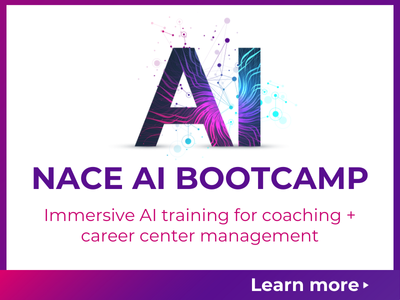We often hear from hiring managers that students have weak interviewing skills. Students may know how to talk about themselves as people but not as a professional. For many, it is out of their comfort zone, because they haven’t completed a degree and don’t think of themselves as a professional yet. Even once they graduate, students may not consider themselves to be a professional until they have acquired a few years of experience in their field. However, to land a professional job, whether before graduation or after, students must see themselves as a professional and be able to talk about themselves as such. To develop this mindset and skill, students need opportunities to talk about their field of study and how they can make valuable contributions to it. These opportunities can be integrated into the syllabus in various ways and in the form of requirements, extra credit assignments, or strongly encouraged.
As with studying a second language, the fastest and best way for a student to become professionally fluent in a field of study is to immerse. For faculty, adding an assessment that entails a one-on-one discussion between student and instructor about the content learned in a chapter or a unit is a way to get students talking about what they know. This form of assessment can be more relevant, engaging, and confidence-building than a traditional exam since students will be expected to discuss their knowledge verbally in professional job interviews. Additionally, this assessment offers instructors an opportunity to integrate the power of body language into instruction and grading criteria, as students should be able to talk about what they have learned while displaying positive and professional body language as expected in an interview. An added bonus to this form of assessment is that it ensures instructors have uninterrupted conversation with each student, offering the chance to create another level of connection and understand who their students are.
Equally important to being able to discuss knowledge in a one-on-one conversation is for students to be able to talk about what they know to a larger audience. Adding a class presentation assessment can help students learn how to adapt their communication skills to their audience. One presentation could be delivered solely to the class while there may be another presentation in which leaders in business and industry will be invited to attend. Doing so provides students the opportunity to experience present their knowledge to an instructor individually, their peers collectively, and a group of professionals who they have never met. These are three very different audiences, and students will gain valuable and relevant skills in adapting their presentation and communication styles to audiences with different levels of experience and knowledge, which is great experience to draw from when answering interview certain questions.
Some additional ways to integrate opportunities for students to learn how to talk about themselves as a professional are to take advantage of the mock interviews offered in your college’s career services department or assign a professional interview question for students to respond to as a homework assignment or in-class assignment, such as a free write in an English class.
As students progress in their careers, there will be times when they will be required to speak to an audience, whether it is giving a tour of the facility in which they work and explaining what they do, going to colleges to speak to groups of students who aspire to be in their industry, presenting at meetings of professional organizations, or teaching and training employees within their organization. They will always need to be able to speak to an audience as a professional about a professional topic and be confident in their ability to do as such.
Shifting the mindset from “I’m just a student who’s still learning” to “I am a professional who will always be learning” is not going to happen quickly. It will take many experiences over time but students do need these experiences, and it is our call to provide the opportunities to gain the experience. If students cannot talk about themselves as a professional, they may become a professional student.






